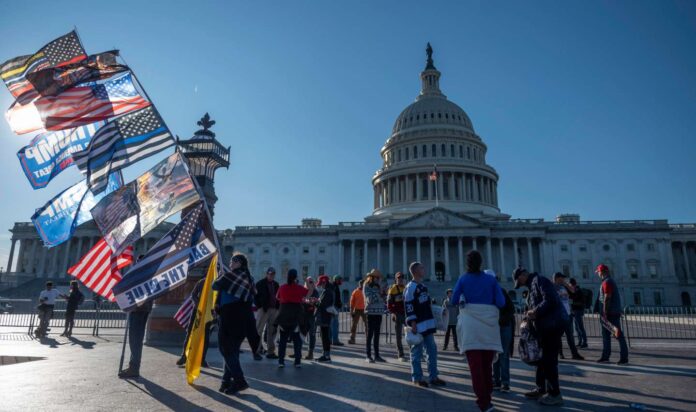
President Donald Trump has been written off by the Democratic Party, much of the mainstream media, members of his own party and—according to some recent polls—much of the American people too.
But as the president continues his Twitter campaign against what he claims as electoral fraud, plenty of his supporters are still listening.
Trump lost this month’s presidential election to challenger Joe Biden, now president-elect. A days-long counting effort gave the appearance of a tight race, but as more ballots are counted it has become clear that the former vice president won comfortably. His projected final total of 306 electoral college votes is the same total garnered by Trump in 2016.
But Trump has been characteristically combative, refusing—publicly at least—to accept the result and commit to a peaceful transition of power. His campaign is resorting to longshot litigation and conspiracy theories to dispute the result; transparent ploys that nonetheless have found fertile ground among America’s polarized voters.
As Trump supporter Jeanie Smith in Mason, Texas told The New York Times: “Now you want to come together. You have not earned it.”
On Saturday, thousands of Trump supporters marched in Washington, D.C. to protest what they see as a Democratic attempt to “steal” the election. They marched to the Supreme Court, where Trump and his allies have suggested they want the election result to be decided.
The president’s motorcade drove past the demonstrators on the way to Trump’s golf club in Sterling, Virginia. Trump later tweeted: “Hundreds of thousands of people showing their support in D.C. They will not stand for a Rigged and Corrupt Election!” This, like many of his recent posts, was flagged by Twitter as misleading.
Fox News’ right-wing commentator Jeanine Pirro summed up the feeling among Trump’s base on her show on Saturday evening. “We are criticized because we are asking questions,” Pirro said, before pivoting to echo the conspiracy theories and false statements used by the Trump campaign regarding the election, plus criticizing steps taken to fight the coronavirus pandemic.
Pirro attacked Biden and his allies for talking “about bringing the country together after they created four years of chaos, accusing Trump of sowing doubt in our democracy.”
“If the answer is President Trump did not win, then on January 20, Joe Biden will be my president,” Pirro said. “But until then. President Trump is my president because America has only one president at a time!”
“And in the meantime, please don’t tell me that we cannot examine the ballots,” Pirro continued. “Please do not tell me that we cannot pursue these irregularities. That’s laughable… Until the certification and the electors vote, that is not a lot to ask. So don’t you dare ask us to just accept it and move on!”
For all his controversies, Trump enjoyed a stubborn level of approval among his base, and a stunningly high approval rating among Republican voters. These people turned out to vote for him in record numbers, giving him the second highest number of votes—behind Biden in first—of any presidential candidate in American history.
Democrats hoped for a national repudiation of Trumpism. Though they won the White House, it is clear that Trump’s abrasive nationalism is not going anywhere. Biden wants to heal American divisions, but some Trump voters are not willing to give him the chance.
Voters dealt Democrats a blow in Congress. Pre-election polls had the Democrats on course to expand their healthy majority in the House and flip the Senate blue. But the GOP has actually gained seven House seats and the battle to control the Senate has been pushed to January, when both Georgia seats will go to a run-off.
Biden’s victory has not stopped Trump rallies. Supporters have coalesced around local ballot counting sites, for example, demanding an end to “the steal” and urging authorities to either stop counting votes or keep counting votes, depending on the state of the race in their respective states. Though small in number, these supporters speak to the uncompromising sentiment among Trump’s base.
Some voters spoke to The Times for an article published Saturday. Smith told the newspaper at her church: “My Democratic friends think Biden is going to heal everything and unify everyone… They are deceived.”
Mark Lehmberg, a parishioner at the same church in Mason, said: “The relationships have already been jeopardized… It’s going be hard—impossible—to get people to come together.”
Most Americans believe Biden has won, and expect Trump to be out of the White House in January. A Reuters/Ipsos poll found that almost 80 percent of respondents believe Biden defeated Trump, including 60 percent of Republicans.
But other polls tell a difference story. A Politico/Morning Consult poll revealed the number of Republicans who do not believe this year’s election was free and fair doubled from 35 percent before Election Day to 70 percent since.
Polls, rallies, street violence and inflammatory media messages all paint a troubling picture of America’s polarization, and indicate avenues for Trump’s campaign to continue his offensive against the democratic system; whether from inside or outside the White House.
For some, no amount of evidence or lost court cases will convince them that Biden has defeated Trump. Karen Bell, a protester at a Trump rally in Dallas, told The Times: “I will not believe that the election was fair… I will not believe that he is a legitimate winner.”






